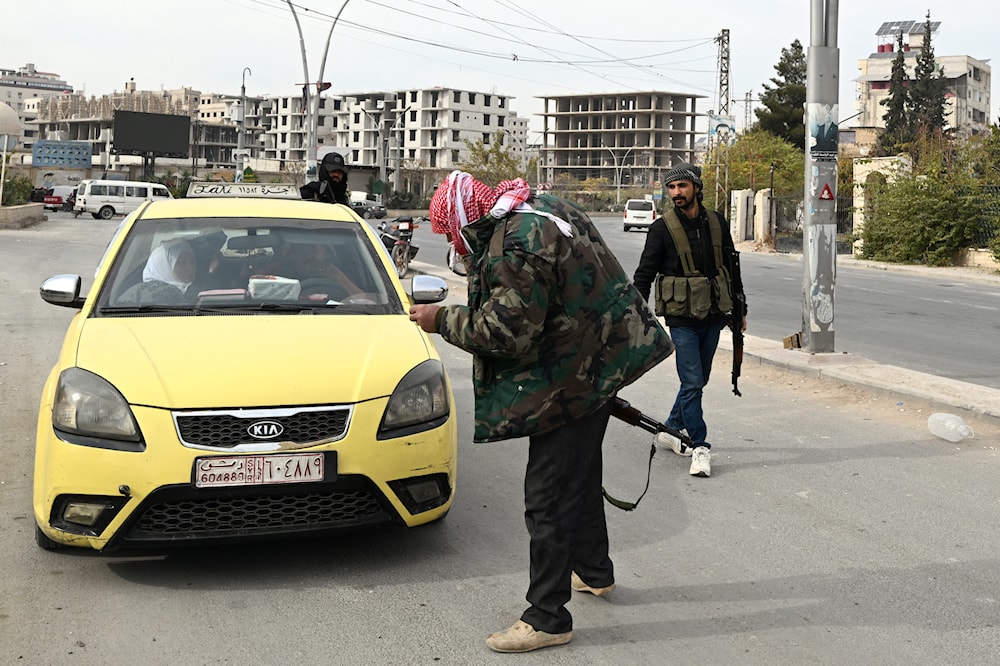HTS-installed interim gov. in Syria raises inclusivity concerns
In Damascus, diplomats have raised concerns about the exclusion of other political opposition leaders.
-

Armed men check vehicles in a street in the district of Sayyeda Zeinab in the southern suburbs of Damascus, on December 11, 2024. (AFP)
The Hay'at Tahrir al-Sham (HTS) group has swiftly consolidated its authority over Syria’s state, demonstrating the same rapid pace that characterized its takeover of the country, Reuters reported.
The group has deployed police forces, installed an interim government, and initiated meetings with foreign envoys, prompting concerns about the inclusivity of Damascus’ new leadership, the news agency pointed out.
Since HTS ousted Bashar al-Assad on Sunday as part of an alliance, its officials—formerly running an Islamist administration in a remote corner of northwestern Syria—have taken over government offices in Damascus.
On Monday, Mohammad al-Bashir, previously head of the regional government in HTS-controlled Idlib, was appointed as Syria’s interim prime minister. This move underscored HTS' dominance among the armed factions that fought for over 13 years to end al-Assad's rule.
Though HTS severed its ties with the al-Qaeda terrorist organization in 2016, it had assured tribal leaders, local officials, and civilians during its advance toward Damascus that minority faiths would be protected.
New interim government lacks inclusivity: Sources
At the Damascus governor’s office, Mohammad Ghazal—a 36-year-old civil engineer from Idlib now overseeing administrative affairs—dismissed fears of an Islamist government.
"There is no such thing as Islamic governance. After all, we are Muslims and it's civil institutions or ministries," he said.
"We don't have any problem with any ethnicity and religion," he claimed, adding that "the one who made the problem was the [Assad] regime."
However, concerns have emerged over the composition of the new interim government, which has heavily relied on administrators from Idlib. Reuters quoted four opposition figures and three diplomats as saying that the process has lacked inclusivity.
While al-Bashir has stated he will only serve until March, HTS, designated as a terrorist organization by the US, Turkiye, and others, has yet to outline critical aspects of the transition, including plans for a new constitution.
"You are bringing (ministers) from one colour, there should be participation of others," stressed Zakaria Malahifji, Secretary General of the Syrian National Movement and former political advisor to the opposition in Aleppo.
He described the lack of consultation in forming the government as a misstep. “Syrian society is diverse in terms of cultures, ethnicities, so frankly this is concerning," he highlighted.
Like other HTS-affiliated "Salvation Government" officials relocated from Idlib to Damascus, Ghazal has urged civil servants to return to work, emphasizing the dire state of the country. “It’s a collapsed state. It’s ruins, ruins, ruins,” he said.
Ghazal’s immediate goals for the next three months include restoring basic services and streamlining bureaucracy. He announced plans to raise salaries, currently averaging $25 per month, to match the minimum $100 wage in the Salvation Government.
Factions rivalries pose risks to stability
Despite HTS' dominance, other armed factions, particularly near the borders with Jordan and Turkey, remain active, posing risks to stability in post-Assad Syria, Reuters noted, adding that rivalries among factions, rooted in years of conflict, further compound these challenges.
Yezid Sayigh, a senior fellow at the Carnegie Middle East Center, suggested that HTS "clearly is seeking to maintain the momentum on all levels." He warned of the risks, including the potential establishment of a new authoritarian regime under Islamic pretense.
However, he pointed out that Syria’s diverse opposition and society would likely prevent any single group from monopolizing power.
In the same context, Reuters cited an opposition source familiar with HTS consultations as claiming that all of Syria’s sects would be represented in the caretaker government.
Over the next three months, key issues to be decided include whether Syria adopts a presidential or parliamentary system, the source added.
In an interview for Il Corriere della Sera on Wednesday, al-Bashir emphasized that the interim government would step down by March 2025. He outlined priorities such as restoring security, reestablishing state authority, repatriating refugees, and providing essential services.
When asked whether the new constitution would have an Islamic framework, al-Bashir stated that such details would be addressed during the constitution-drafting process.
In Damascus, diplomats have raised concerns about the exclusion of other political opposition leaders. "We are concerned - where are all the heads of the political opposition," said one diplomat. Another noted the potential destabilizing impact of armed factions yet to disarm or demobilize.
Joshua Landis, a Syria expert and director of the Center for Middle East Studies at the University of Oklahoma, suggested that al-Jolani "must assert authority quickly to stop a decent into chaos."
"But he must also try to scale up his administrative capacity by bringing in technocrats and representatives of the diverse communities," Landis stressed.
Read more: Al-Jolani's promises must be fulfilled: Syrian domestic forces

 5 Min Read
5 Min Read








